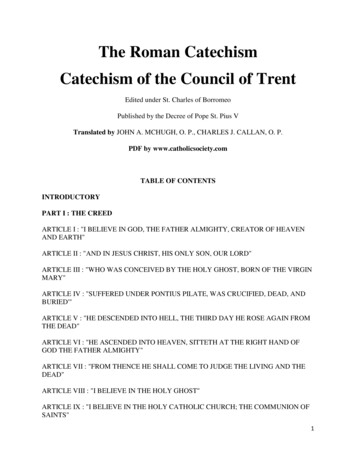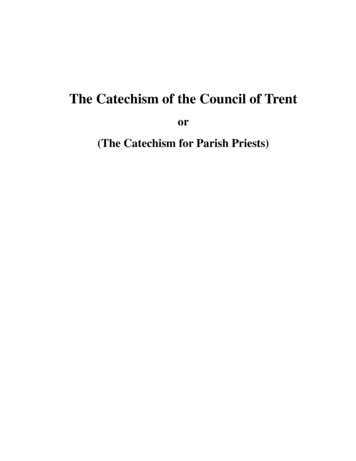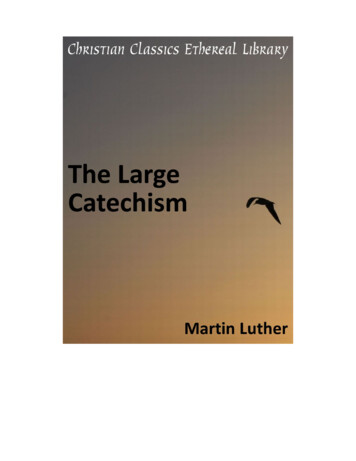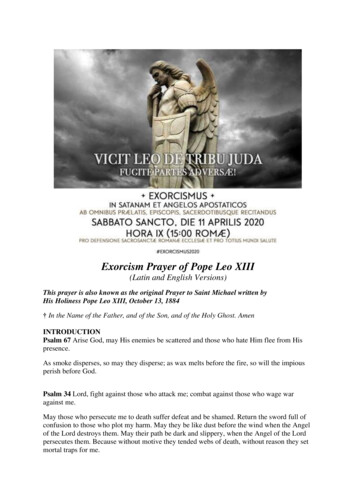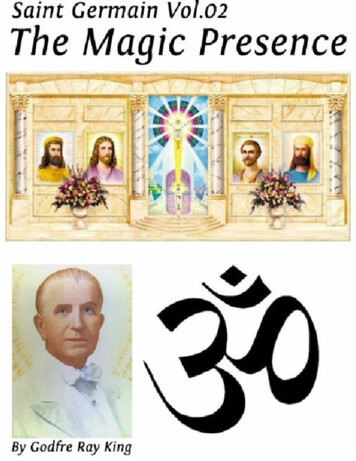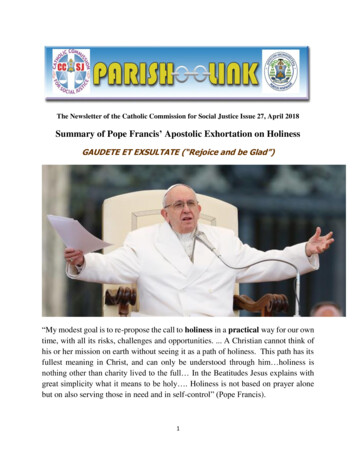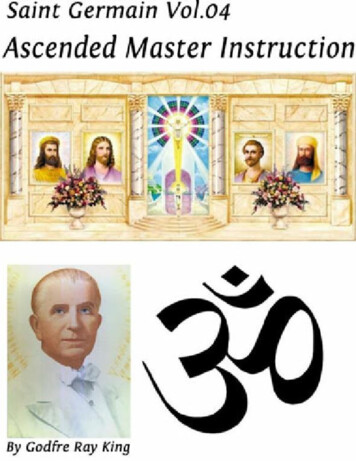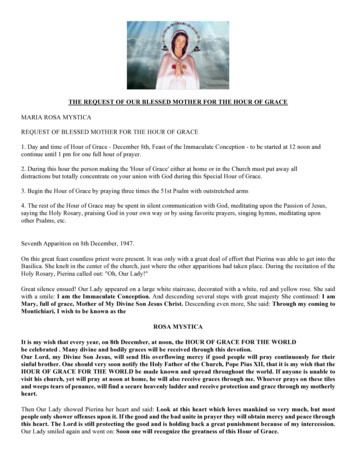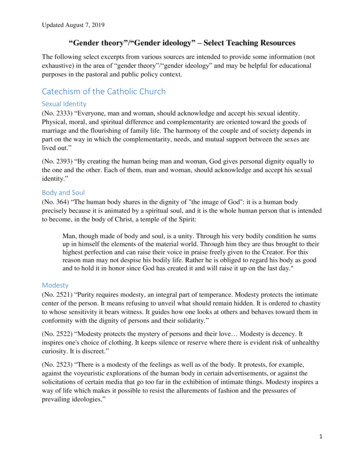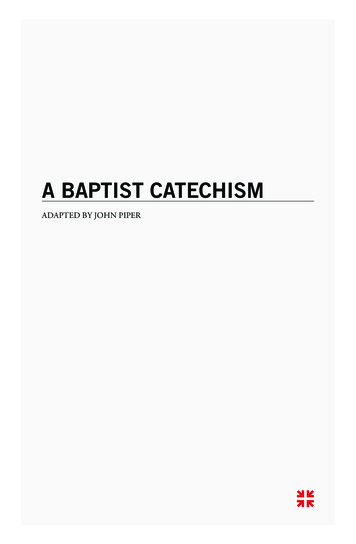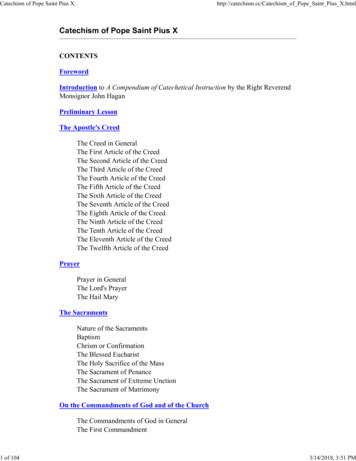
Transcription
Catechism of Pope Saint Pius X1 of 104http://catechism.cc/Catechism of Pope Saint Pius X.htmlCatechism of Pope Saint Pius XCONTENTSForewordIntroduction to A Compendium of Catechetical Instruction by the Right ReverendMonsignor John HaganPreliminary LessonThe Apostle's CreedThe Creed in GeneralThe First Article of the CreedThe Second Article of the CreedThe Third Article of the CreedThe Fourth Article of the CreedThe Fifth Article of the CreedThe Sixth Article of the CreedThe Seventh Article of the CreedThe Eighth Article of the CreedThe Ninth Article of the CreedThe Tenth Article of the CreedThe Eleventh Article of the CreedThe Twelfth Article of the CreedPrayerPrayer in GeneralThe Lord's PrayerThe Hail MaryThe SacramentsNature of the SacramentsBaptismChrism or ConfirmationThe Blessed EucharistThe Holy Sacrifice of the MassThe Sacrament of PenanceThe Sacrament of Extreme UnctionThe Sacrament of MatrimonyOn the Commandments of God and of the ChurchThe Commandments of God in GeneralThe First Commandment3/14/2018, 3:51 PM
Catechism of Pope Saint Pius X2 of 104http://catechism.cc/Catechism of Pope Saint Pius X.htmlThe Second CommandmentThe Third CommandmentThe Fourth CommandmentThe Fifth CommandmentThe Sixth CommandmentThe Seventh CommandmentThe Eighth CommandmentThe Ninth CommandmentThe Tenth CommandmentThe Precepts of the ChurchOn the Virtues and VicesTheological VirtuesOn FaithThe Mysteries of FaithOn Holy ScriptureOn Tradition.On HopeOn CharityOn The Cardinal VirtuesThe Gifts of the Holy GhostThe BeatitudesThe Main Kinds of SinsThe Vices and other Very Grievous SinsWorks of Mercy ForewordAfter the Second Vatican Council, a number of new catechisms appeared which didnot present Catholic Doctrine as it should be presented, and these new publicationseven included some very grave errors. Coupled with the new methods, wherebychildren are not required to memorize, two generations of children have grown upnot knowing the Catholic Faith. For many years Rome did nothing. Now there hasbeen published the new Catechism of the Catholic Church. It has been written forBishops, who are required to adapt it to the needs of the faithful. One may fear thatsome Bishops will put off this task for a very long time, others will water-down theDoctrine even further, yet others will give only a partial presentation of the Doctrine,leaving important points untold.Thus the need is still great for a Catechism to be put in the hands of the student inwhich he may find clear and complete answers to his questions. What better couldbe given him than the Catechism of St. Pius X, the holy Pope of the modern era?3/14/2018, 3:51 PM
Catechism of Pope Saint Pius X3 of 104http://catechism.cc/Catechism of Pope Saint Pius X.htmlTo my knowledge, the Catechism of St. Pius X has never been published in Englishin its original text. There is one Catechism of Christian Doctrine, published by theRev. Msgr. Eugene Kevane in Virginia, USA in 1974, but in fact, it contains a muchlater text which lacks much of the original text: it is the translation of theCatechismo della Dottrina Cristiana, the standard Italian Catechism, as it was in1953. That Italian Catechism is in turn, a summary and reduction of the originalCatechism of St. Pius X. The American edition in 1974 has further been "adaptedaccording to the Second Vatican Council", thus losing much of the value of theoriginal text (e.g. expressions like "Soldiers of Christ" are suppressed from theteaching on the effects of Confirmation). The only book where I was able to find theauthentic text is the excellent Compendium of Catechetical Instruction by the RightReverend Monsignor John Hagan, first published in Dublin in 1910, and containingfor each chapter of the Catechism the relevant part from the Catechism of theCouncil of Trent, the questions and answers of the Catechism of Saint Pius X andFather Raineri's Catechetical Instructions, which were very popular in thenineteenth century.We present here Msgr. Hagan's text with very slight modifications of style only. Thecurrent discipline of the Church on matters such as fasting has been included insmaller print to bring the text up-to-date without altering the original answers.May this edition of Saint Pius X's Catechism help priests, teachers and parents toimpart the knowledge and love of the Doctrine of the Catholic Church to their pupilsand their children in all its entirety and beauty. It is our hope that it will also helpadult Catholics to revise and deepen their own knowledge of the Faith. It will bevery helpful to catechumens to assist them towards a complete knowledge of the onetrue Faith. May the clear knowledge of the eternal truths of our Faith build in allreaders the great certitudes that are the foundations of solid virtues. May theImmaculate Heart of the Blessed Virgin Mary obtain all these graces for the readersof this volume, and may they pray for me.[ABRIDGED from the introduction of Father Francois Laisney 1993 SydneyAustralia]* * *Introductionto A Compendium of Catechetical Instruction by theRight Reverend Monsignor John HaganThe Catechism, as we now know it, is of comparatively recent origin.Previous to the invention of printing, and the consequent possibility of the spread ofbooks and education among the masses of the people, the widespread use of aCatechism was plainly out of the question. Its place was supplied by brief formulae,not infrequently set to rhyme, which were committed to memory and handed downfrom generation to generation, conveying a brief statement of the truths morenecessary to salvation. The nearest approaches to the modern Catechism would be3/14/2018, 3:51 PM
Catechism of Pope Saint Pius X4 of 104http://catechism.cc/Catechism of Pope Saint Pius X.htmlSt. Cyril's Catechesis, St. Augustine's Instruction of the Ignorant, and, later on,certain works of Alcuin, Rabanus Maurus, and Gerson.The publication and widespread diffusion of an infinity of Catechisms compiled byLuther and his followers for the purpose of disseminating their new doctrines,stimulated the energies of Catholic writers in a similar direction; and accordinglyseveral Catholic Catechisms were issued within the next few years giving a clearand simple statement of Catholic doctrine, particularly on those points that werebeing attacked by the reformers. Of these, several of which were prescribed fordiocesan use, the principal were those of Erasmus, Witzel, Dietenberg, Fabri,Titelmann, Hosius, and Blessed Peter Canisius, in Germany; of Parvi, de Bourbon,du Bellay, de Thou, in France; of Sonnius, Hessel, and Hunnaeus, in the LowCountries; of Dominic Soto, John of St Thomas, and Florez, in Spain; ofBartholomew of the Martyrs and Louis of Granada in Portugal; and of CardinalContarini, Marini, and Crispoldi, in Italy.But, as already pointed out, the Fathers of the Council of Trent showed at a veryearly date that they were satisfied with none of the existing works, and that theywere fully alive to the need and necessity of preparing an authoritative Catechism.The realisation of their desire, however, was retarded for several years by eventsover which they had little control; and when the work was finally taken in handanother idea prevailed, resulting in the publication of a manual for the use of theclergy, and not, as originally suggested, a Catechism for children and uninstructedadults.Of the countless Catechisms that continued to appear, two — those of Bellarmineand Canisius — have steadily held their ground ever since, and to a large extenthave served as the models of nearly an subsequent compilations of the kind. Theinfluence of Canisius, however, has on the whole been limited to Germany; whereasBellarmine's Catechism , which was written by command of Pope Clement VIII in1597, has been copied in almost every other country in the world. At an early date itwas translated into Arabic, Latin, Modem Greek, French, Spanish, German, English,and Polish. It had the warm approbation of Clement VIII, who prescribed it for usein the Papal States; of Urban VIII, who directed it to be adopted in all the Easternmissions; of Innocent XIII and Benedict XIV; particularly of the very importantCouncil of all Italy, held at Rome, in 1725, which made it obligatory in all thedioceses of the peninsula; and finally of the Vatican Council which indicated it asthe model for a proposed universal Catechism.Though Bellarmine's Catechism was largely followed as a model all over the world,yet, owing to the modifications introduced in diocesan editions, it came to pass inthe course of time that almost every diocese had its own Catechism, differing inmany respects from the Catechisms of other dioceses.The obvious inconvenience of this bewildering multiplicity of Catechisms occupiedthe attention of the Fathers of the Vatican Council, the great majority of whom wereagreed as to the desirability of having a uniform small Catechism for the faithful allover the world. Early during the sittings of the Council, forty-one of the assembled3/14/2018, 3:51 PM
Catechism of Pope Saint Pius X5 of 104http://catechism.cc/Catechism of Pope Saint Pius X.htmlFathers devoted six sessions (February 10 to February 22) to an examination of thequestion; and the report which they drew up occupied the attention of the wholeCouncil during the sittings of April 29 and 30. The question being put to a vote onMay 4, an immense majority was found to be in favour of the compilation of a smalluniform Catechism, to be compiled in Latin, translated into every language, andmade obligatory in every diocese. But the approach of the Italian troops towards thewalls of Rome brought the Council to an untimely end and there was no time topromulgate the constitution on the proposed uniform Catechism, so that it has notthe force of law.The idea, however, has never been lost sight of. During the sitting of the firstCatechetical Congress in 1880, the then Bishop of Mantua (later St. Pius X)proposed that the Holy Father be petitioned to arrange for the compilation of asimple, plain, brief, and popular Catechism for uniform use all over the world.Shortly after his elevation to the Chair of Peter, Pius X at once set about realising,within certain limits, his own proposal of 1880, by prescribing a uniform Catechism— the Compendium of Christian Doctrine — for use in the dioceses of theecclesiastical province of Rome, at the same time indicating that it was his earnestdesire to have the same manual adopted all over Italy. The text selected was, withslight modifications, that which had been adopted for some years by the unitedhierarchy of Piedmont, Liguria, Lombardy, Emilia, and Tuscany.It contains three Catechisms.The first, which is intended for infant schools and for the home, and which coversabout thirteen pages, sets forth briefly the more elementary truths of faith, chiefly byway of formulae to be committed to memory.The second part, called the "Short Catechism," is intended chiefly for primaryschools and for children preparing for the sacraments. It contains about sixty pagesdevoted to a brief exposition of the doctrine of the Creed, Sacraments,Commandments, and Prayer.The "Larger Catechism," which forms the third part, explains these at greater lengthin about 200 pages. It is succeeded by an explanation of the principal feasts of theyear, covering sixty pages, followed by forty pages of a Brief History of Religion,and concludes with a certain number of daily prayers, and prayers for specialoccasions.J.H. Irish College, Rome Feast of Saint Charles Borromeo, 1911.Preliminary LessonOn Christian Doctrine and its Principal Parts1 Q. Are you a Christian?A. Yes, I am a Christian, by the grace of God.3/14/2018, 3:51 PM
Catechism of Pope Saint Pius X6 of 104http://catechism.cc/Catechism of Pope Saint Pius X.html2 Q. Why do you say: By the grace of God?A. I say: By the grace of God, because to be a Christian is a perfectly gratuitous giftof God, which we ourselves could not have merited.3 Q. Who is a true Christian?A. A true Christian is he who is baptised, who believes and professes the ChristianDoctrine, and obeys the lawful pastors of the Church.4 Q. What is Christian Doctrine?A. Christian doctrine is the doctrine which Jesus Christ our Lord taught us to showus the way of salvation.5 Q. Is it necessary to learn the doctrine taught by Jesus Christ?A. It certainly is necessary to learn the doctrine taught by Jesus Christ, and thosewho fail to do so are guilty of a grave breach of duty.6 Q. Are parents and guardians bound to send their children and those dependent onthem to catechism?A. Parents and guardians are bound to see that their children And dependents learnChristian Doctrine, and they are guilty before God if they neglect this duty.7 Q. From whom are we to receive and learn Christian Doctrine?A. We are to receive and learn Christian Doctrine from the Holy Catholic Church.8 Q. How are we certain that the Christian Doctrine which we receive from the HolyCatholic Church is really true?A. We are certain that the doctrine which we receive from the Holy Catholic Churchis true, because Jesus Christ, the divine Author of this doctrine, committed itthrough His Apostles to the Church, which He founded and made the infallibleteacher of all men, promising her His divine assistance until the end of time.9 Q. Are there other proofs of the truth of Christian Doctrine?A. The truth of Christian Doctrine is also shown by the eminent sanctity of numberswho have professed it and who still profess it, by the heroic fortitude of the martyrs,by its marvellous and rapid propagation in the world, and by its perfect preservationthroughout so many centuries of ceaseless and varied struggles.10 Q. What and how many are the principal and most necessary parts of ChristianDoctrine?A. The principal and most necessary parts of Christian Doctrine are four The Creed,The Our Father, The Commandments, and The Sacraments.11 Q. What does the Creed teach us?A. The Creed teaches us the principal articles of our holy faith .12 Q. What does the Our Father teach us?A. The Our Father teaches us all that we are to hope from God, and all we are to askof Him.3/14/2018, 3:51 PM
Catechism of Pope Saint Pius X7 of 104http://catechism.cc/Catechism of Pope Saint Pius X.html13 Q. What do the Commandments teach us?A. The Commandments teach us all that we are to do to please God - all of which issummed up in loving God above all things and our neighbour as ourselves for thelove of God14 Q. What does the doctrine of the Sacraments teach us?A. The doctrine of the Sacraments shows us the nature and right use of those meanswhich Jesus Christ has instituted to remit our sins, give us His grace, infuse into andincrease in us the virtues of faith, hope, and charity.The Apostle's CreedThe Creed in General1 Q. What is the first part of Christian Doctrine?A. The first part of Christian Doctrine is the Symbol of the Apostles, commonlycalled the Creed.2 Q. Why do you call the Creed the Symbol of the Apostles?A. The Creed is called the Symbol of the Apostles because it is a summary of thetruths of faith taught by the Apostles.3 Q. How many articles are there in the Creed?A. There are twelve articles in the Creed.4 Q. Recite them.A. (1) I believe in God, the Father Almighty, Creator of heaven and earth; (2) And inJesus Christ, His only Son, our Lord; (3) Who was conceived by the Holy Ghost;born of the Virgin Mary; (4) Suffered under Pontius Pilate: was crucified, dead, andburied; (5) He descended into hell: the third day He rose again from the dead; (6) Heascended into Heaven: sitteth at the right hand of God the Father Almighty; (7)From thence He shall come to judge the living and the dead. (8) I believe in the HolyGhost; (9) The Holy Catholic Church; the Communion of Saints; (10) Theforgiveness of sins; (11) The resurrection of the body; (12) Life everlasting. Amen.5 Q. What is meant by the word: "I believe", which you say at the beginning of theSymbol?A. The word: I believe, means I hold everything that is contained in these twelvearticles to be perfectly true; and I believe these truths more firmly than if I saw themwith my eyes, because God, who can neither deceive nor be deceived, has revealedthem to the Holy Catholic Church and through this Church to us.6 Q. What do the articles of the Creed contain?A. The articles of the Creed contain the principal truths to be believed concerningGod, Jesus Christ, and the Church, His Spouse.7 Q. Is it useful to recite the Creed frequently?3/14/2018, 3:51 PM
Catechism of Pope Saint Pius X8 of 104http://catechism.cc/Catechism of Pope Saint Pius X.htmlA. It is most useful to recite the Creed frequently, so as to impress the truths of faithmore and more deeply on our hearts.The First Article of the CreedGod the Father Almighty1 Q. What does the First Article of the Creed: I believe in God, the Father Almighty,Creator of heaven and earth, teach us?A. The First Article of the Creed teaches us that there is one God, and only one; thatHe is omnipotent and has created heaven and earth and all things contained in them,that is to say, the whole Universe.2 Q. How do we know that there is a God?A. We know that there is a God because reason proves it and faith confirms it.3 Q. Why do we call God the Father?A. We call God the Father because by nature He is the Father of the Second Personof the Blessed Trinity, that is to say, of the Son begotten of Him; because God is theFather of all men, whom He has created and whom He preserves and governs;finally, because by grace He is the Father of all good Christians, who are hencecalled the adopted sons of God.4 Q. Why is the Father the First Person of the Blessed Trinity?A. The Father is the First Person of the Blessed Trinity, because He does not proceedfrom any other Person, but is the Principle of the other two Persons, that is, of theSon and of the Holy Ghost.5 Q. What is meant by the word Omnipotent?A. The word Omnipotent means that God can do all that He wills.6 Q. God can neither sin nor die, how then do we say He can do all things?A. Though He can neither sin nor die, we say God can do all things, because to beable to sin or die is not an effect of power, but of weakness which cannot exist inGod who is most perfect.On the Creation7 Q. What is meant by the words: Creator of heaven and earth?A. To create means to make out of nothing; hence, God is called the Creator ofheaven and of earth, because He made heaven and earth and all things containedtherein, that is, the whole Universe, out of nothing.8 Q. Was the world created by the Father alone?A. The world was created by all the Three Divine Persons, because whatever onePerson does with regard to creatures is done by the other two Persons in one and theselfsame act.9 Q. Why then is creation specially attributed to the Father?A. Creation is specially attributed to the Father because creation is a work of Divine3/14/2018, 3:51 PM
Catechism of Pope Saint Pius X9 of 104http://catechism.cc/Catechism of Pope Saint Pius X.htmlOmnipotence, which is specially attributed to the Father, just as wisdom is attributedto the Son, and goodness to the Holy Ghost, though all three Persons possess thesame Omnipotence, Wisdom, and Goodness.10 Q. Does God take any interest in the world and in the things created by Him?A. Yes, God takes an interest in the world and in all things created by Him; Hepreserves them, and governs them by His infinite goodness and wisdom; andnothing happens here below that He does not either will or permit.11 Q. Why do you say that nothing happens here below that He does not either willor permit?A. We say that nothing happens here below that He does not either will or permit,because there are some things which God wills and commands, while there areothers which He simply does not prevent, such as sin.12 Q. Why does not God prevent sin?A. God does not prevent sin, because even from the very abuse man makes of theliberty with which He is endowed, God knows how to bring forth good and to makeHis mercy or His justice become more and more resplendent.The Angels13 Q. Which are the noblest of God's creatures?A. The noblest creatures created by God are the Angels.14 Q. Who are the Angels?A. The Angels are intelligent and purely spiritual creatures.15 Q. Why did God create the Angels?A. God created the Angels so as to be honoured and served by them, and to givethem eternal happiness.16 Q. What form and figure have the Angels?A. The Angels have neither form nor material figure of any kind, because they arepure spirits created by God in such a way as to exist without having to be united to abody.17 Q. Why then are the angels represented under sensible forms?A. The Angels are represented under sensible forms: (1) As a help to ourimagination; (2) Because they have thus appeared many times to men, as we read inSacred Scripture.18 Q. Were all the angels faithful to God?A. No, the Angels were not all faithful to God, many of them through pride claimedto be His equals and independent of Him — for which sin they were banished forever from Paradise and condemned to hell.19 Q. What are the Angels called who were banished for ever from Paradise andcondemned to hell?3/14/2018, 3:51 PM
Catechism of Pope Saint Pius X10 of 104http://catechism.cc/Catechism of Pope Saint Pius X.htmlA. The Angels banished for ever from Paradise and condemned to hell are calleddemons, and their chief is called Lucifer or Satan.20 Q. Can the demons do us any harm?A. Yes, the demons can do us great harm both in soul and body, especially bytempting us to sin, provided God permits them to do so.21 Q. Why do they tempt us?A. The demons tempt us because of the envy they bear us, which makes them desireour eternal damnation; and because of their hatred of God. whose image is reflectedin us. God on the other hand permits these temptations in order that we mayovercome them by His grace, and thus practise virtue and acquire merit for Heaven.22 Q. How are temptations conquered?A. Temptations are conquered by watchfulness, prayer and Christian mortification.23 Q. What are the angels called who remained faithful to God?A. The Angels who remained faithful to God are called the good Angels, heavenlySpirits, or simply Angels.24 Q. What became of the Angels who remained faithful to God?A. The Angels who remained faithful to God were confirmed in grace, for ever enjoythe vision of God, love Him, bless Him, and praise Him eternally.25 Q. Does God use the Angels as His ministers?A. Yes, God uses the Angels as His ministers, and especially does He entrust tomany of them the office of acting as our guardians and protectors.26 Q. Should we have a particular devotion to our Guardian Angel?A. Yes, we should have a particular devotion to our Guardian Angel; we shouldhonour him, invoke his aid, follow his inspirations, and be grateful to him for thecontinual assistance he affords us.Man27 Q. Which is the noblest creature God has placed on earth?A. The noblest creature God has placed on earth is man.28 Q. What is man?A. Man is a rational creature composed of soul and body.29 Q. What is the soul?A. The soul is the noblest part of man, because it is a spiritual substance, endowedwith intelligence and will, capable of knowing God and of possessing Him for alleternity.30 Q. Can the human soul be seen and touched?A. Our soul can neither be seen nor touched, because it is a spirit.31 Q. Does the human soul die with the body?3/14/2018, 3:51 PM
Catechism of Pope Saint Pius X11 of 104http://catechism.cc/Catechism of Pope Saint Pius X.htmlA. The human soul never dies; faith and our very reason prove that it is immortal.32 Q. Is man free in his actions?A. Yes, man is free in his actions and each one feels within himself that he can do athing or leave it undone, or do one thing rather than another.33 Q. Explain human liberty by an example.A. If I voluntarily tell a lie, I know that I could have left it unsaid or that I could haveremained silent, and that, on the other hand, I could also speak differently and tellthe truth.34 Q. Why do we say that man was created to the image and likeness of God?A. We say that man was created to the image and likeness of God because the humansoul is spiritual and rational, free in its operations, capable of knowing and lovingGod and of enjoying Him for ever — perfections which reflect a ray of the infinitegreatness of the Lord in us.35 Q. In what state did God place our first parents, Adam and Eve?A. God placed our first parents, Adam and Eve, in the state of innocence and grace;but they soon fell away by sin.36 Q. Besides innocence and sanctifying grace did God confer any other gifts on ourfirst parents?A. Besides innocence and sanctifying grace, God conferred on our first parents othergifts, which, along with sanctifying . grace, they were to transmit to theirdescendants; these were: (1) Integrity, that is, the perfect subjection of sense .reason; (2) Immortality; (3) Immunity from all pain and sorrow; (4) A knowledge inkeeping with their state.37 Q. What was the nature of Adam's sin?A. Adam's sin was a sin of pride and of grave disobedience.38 Q. What chastisement was meted out to the sin of Adam and Eve?A. Adam and Eve lost the grace of God and the right they had to Heaven; they weredriven out of the earthly Paradise, subjected to many miseries of soul and body, andcondemned to death.39 Q. If Adam and Eve had not sinned, would they have bee exempt from death?A. If Adam and Eve had not sinned and if they had remained faithful to God, theywould, after a happy and tranquil sojourn here on earth, and without dying, havebeen transferred by God into Heaven, to enjoy a life of unending glory.40 Q. Were these gifts due to man?A. These gifts were in no way due to man, but were absolutely gratuitous andsupernatural; and hence, when Adam disobeyed the divine command, God couldwithout any injustice deprive both Adam and his posterity of them.41 Q. Is this sin proper to Adam alone?A. This sin is not Adam's sin alone, but it is also our sin, though in a different sense.3/14/2018, 3:51 PM
Catechism of Pope Saint Pius X12 of 104http://catechism.cc/Catechism of Pope Saint Pius X.htmlIt is Adam's sin because he committed it by an act of his will, and hence in him itwas a personal sin. It is our sin also because Adam, having committed it in hiscapacity as the head and source of the human race, it was transmitted by naturalgeneration to all his descendants: and hence in us it is original sin.42 Q. How is it possible for original sin to be transmitted to all men?A. Original sin is transmitted to all men because God, having conferred sanctifyinggrace and other supernatural gifts on the human race in Adam, on the condition thatAdam should not disobey Him; and Adam having disobeyed, as head and father ofthe human race, rendered human nature rebellious against God. And hence, humannature is transmitted to all the descendants of Adam in a state of rebellion againstGod, and deprived of divine grace and other gifts.43 Q. Do all men contract original sin?A. Yes, all men contract original sin, with the exception of the Blessed Virgin, whowas preserved from it by a singular privilege of God, in view of the merits of JesusChrist our Saviour.44 Q. Could not men be saved after Adam's sin?A. After Adam's sin men could not be saved, if God had not shown mercy towardsthem.45 Q. What was the mercy shown by God to the human race?A. The mercy shown by God to the human race was that of immediately promisingAdam a divine Redeemer or Messiah, and of sending this Messiah in His own goodtime to free men from the slavery of sin and of the devil.46 Q. Who is the promised Messiah?A. The promised Messiah is Jesus Christ, as the Second Article of the Creed teaches.The Second Article of the Creed1 Q. What are we taught in the Second Article: And in Jesus Christ His only Son ourLord?A. The Second Article of the Creed teaches us that the Son of God is the SecondPerson of the Blessed Trinity; that, like the Father, He is God eternal, omnipotent,Creator and Lord; that He became man to save us; and that the Son of God, mademan, is called Jesus Christ.2 Q. Why is the Second Person called the Son?A. The Second Person is called the Son, because He is begotten by the Father fromall eternity by way of intelligence; and for this reason He is also called the EternalWord of the Father.3 Q. Since we also are sons of God, why is Jesus Christ called the only Son of Godthe Father?A. Jesus Christ is called the only Son of God the Father, because He alone is His Sonby nature, whereas we are His sons by creation and adoption.3/14/2018, 3:51 PM
Catechism of Pope Saint Pius X13 of 104http://catechism.cc/Catechism of Pope Saint Pius X.html4 Q. Why is Jesus Christ called our Lord?A. Jesus Christ is called our Lord, because, not only did He as God, together with theFather and the Holy Ghost, create us; but He has also as God and Man redeemed us.5 Q. Why is the Son of God, made man, called Jesus?A. The Son of God, made man, is called Jesus, that is to say, Saviour, because Hehas saved us from the eternal death merited by our sins.6 Q. Who gave the name of Jesus to the Son of God, made man?A. The Eternal Father Himself, through the Archangel Gabriel, gave the name ofJesus to the Son of God made man, at the moment when the Archangel announced tothe Blessed Virgin the mystery of the Incarnation.7 Q. Why is the Son of God made man also called Christ?A. The Son of God made man is also called Christ , that is to say, anointed orconsecrated, because kings, priests and prophets were anointed of old; and Jesus isthe King of kings, High Priest, and supreme Prophet.8 Q. Was Jesus Christ really anointed and consecrated with a material anointing?A. The anointing of Jesus Christ was not material, like that of the kings, priests andprophets of old, but wholly spiritual and divine, because the fullness of the Divinitydwells in Him substantially.9 Q. Had men any idea of Jesus C
books and education among the masses of the people, the widespread use of a Catechism was plainly out of the question. Its place was supplied by brief formulae, not infrequently set to rhyme, which were committed to memory and handed down from generation to generation, conveying a b
